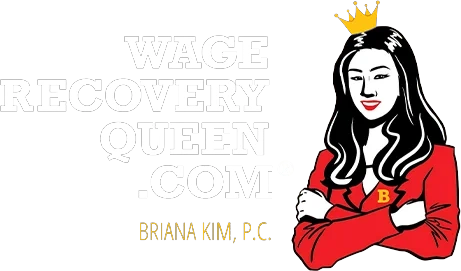Long Beach Wage and Hour Lawyer

- Passionate
- Perseverant
- Reputable
- Resilient
Long Beach Wage and Hour Attorney
In the state of California, all employers are required to abide by state and federal employment laws and pay most employees for overtime worked beyond the eight-hour workday, or forty-hour workweek. California employees are generally classified as either exempt employees or non-exempt employees. If you are not being paid for your overtime hours or feel your job has been misclassified as being exempt from overtime laws, your employer is most likely violating California law. You must take step for your minimum wage issue and contact a skilled Long Beach wage and hour attorney.
The Law Office of Briana Kim can help determine your rights to overtime pay in the workplace. Our attorney, Briana M. Kim, has handled employment law cases and helped many clients get justice. Contact us today for a free consultation.
The law regarding overtime is fairly simple: a non-exempt employee must be paid time-and-a-half for all hours worked over eight hours in any workday and over 40 hours in a workweek.
Some companies routinely violate wage-and-hour laws, by making non-exempt employees work through lunch breaks, take unpaid rest breaks, or open or close the business on unpaid time. Others classify certain workers as managerial and therefore treat them as “exempt” from wage-and-hour laws, even when these employees are not really managers, as defined by California law. In some cases, this can lead to workplace discrimination, especially when certain groups of employees, such as women or minority workers, are unfairly targeted or treated differently regarding overtime or classification. If you and your co-workers have been made to work off-the-clock or if you have been mistakenly classified as an exempt employee, you may be entitled to compensation for your unpaid overtime and benefits. You must take legal steps to get justice if you are experiencing a minimum wage law violation.
Here are some key points to remember in regard to the State of California Overtime Rules:
- California overtime law provides that an employee be provided California overtime pay when working in excess of 40 hours per week OR in excess of 8 hours per day.
- California labor law exempts employees who, among other things, perform exempt duties in excess of 50% of the time. This means employers must carefully examine whether or not exempt employees are truly exempt by the actual duties they perform (versus their job title or the mere fact they are salaried and labeled exempt).
- California law overtime pay requirements are extremely strict and may result in payment of up to 4 years of back overtime pay, interest, penalties, and the attorney fees of the employee. California overtime rules typically favor the employee. This means, for example, California labor laws for exempt employees require employers to prove such employees are exempt.
- California labor laws shift work hours are governed by the alternative work week rules if employers seek to work employees more than 8 hours per day without overtime pay. Alternative work week schedules of, for example, four “10 hour days” must be approved by a vote of the employees and such vote must be recorded at the Department of Labor Standards Enforcement.
- California labor laws on-call duties are complicated when it comes to compensable overtime and are typically based on how restricted the employee is while on call. If, for example, an employee must always be near a land line to log onto a server, it may be construed that such employee is entitled to California overtime pay for the entire time of the restriction. California law overtime pay requirements typically favor employees and on call time is no different.
Meal Periods
Pursuant to California Labor Code section 512 and the applicable Wage Order, the employer is obligated to provide an uninterrupted meal period (in which employees are relieved of any duty or employer control and are free to come and go as they please) of not less than thirty (30) minutes after employing a non-exempt person to work for five (5) hours, absent 1. a mutually agreed-upon waiver if the workday is six (6) hours or less or 2. written agreement to an on-duty meal period (if circumstances permit this). There are certain terms that must be contained in the written agreement pursuant to California Code of Regulations, Title 8, §11040. Most jobs do not qualify for “on duty” meal breaks. It is clear that under California labor laws, meal breaks can simply not be waived by employers without a written, revocable agreement with employees. Should employers fail to give employees their required meal period, such employees must be compensated in the amount of one hour’s worth of wages.
While employers are not required to ensure that no work is performed during its employees’ meal periods, employers cannot undermine a formal meal period policy by pressuring its employees to work (i.e. implementing an informal anti-meal-break policy through reprimand). Indeed, if employers knew or reasonably should have known that its employees were working during their meal period, then they will be responsible for compensating (at straight pay) their employees for such time worked.
The first meal period must be provided after no more than five (5) hours of work.* If an employee is entitled to a second meal period, it must be provided after no more than ten (10) hours of work.**
* Unless the total daily work period is no more than six (6) hours, and the parties mutually agreed to waive the employee’s meal period. ** Unless the total daily work period is no more than twelve (12) hours and the employee took the first meal period, and the parties mutually agreed to waive the second meal period.
Rest Periods
Pursuant to the Industrial Welfare Commission’s (“IWC”) Wage Orders, rest time will be determined on the total hours worked daily, at the rate of ten (10) minutes of net rest time for four (4) hours or major fraction thereof (which means a fraction greater than ½, such that if an employee worked more than six (6) hours in a day he/she would get twenty (20) minutes of net rest time). Rest time does not need to be provided for employees whose total daily work time is less than three and one-half (3½) hours. In effect, employees are essentially entitled to 10 minutes’ rest for shifts from 3½ to 6 hours in length; 20 minutes’ for shifts more than 6 hours up to 10 hours; 30 minutes’ for shifts more than 10 hours up to 14 hours; and so on. Ex: Rachel works for an employer with a written policy applicable to all its employees, in which its employees are authorized to receive one 10-minute break for each four hours worked. Rachel regularly works 7 hours a day but only receives one 10-minute break per Company policy. The Company is not complying with the rest break policy in California. While employers are not legally obligated to permit employees to have a rest period before any meal period, employers are still required to make a good faith effort to permit rest breaks in the middle of work periods, insofar as it is feasible.
Tip Pooling
No employer or agent shall collect, take, or receive any gratuity or a part thereof that is paid, given to, or left for an employee by a patron, or deduct any amount from wages due an employee on account of a gratuity, or require an employee to credit the amount, or any part thereof, of a gratuity against and as a part of the wages due the employee from the employer. Every gratuity is hereby declared to be the sole property of the employee or employees to whom it was paid, given, or left for. An employer that permits patrons to pay gratuities by credit card shall pay the employees the full amount of the gratuity that the patron indicated on the credit card slip, without any deductions for any credit card payment processing fees or costs that may be charged to the employer by the credit card company. Payment of gratuities made by patrons using credit cards shall be made to the employees not later than the next regular payday following the date the patron authorized the credit card payment.
In short, no part of tips or gratuities given to an employee can be shared with or taken by the employer or its managerial employees, nor can they be used to subsidize employer obligations to pay minimum wages. (Although a recent court of appeal decision held that tips provided in a collective tip jar for Starbucks’ employees could be shared with “shift supervisors” after concluding they primarily provided services to customers and customers intended for those supervisors to share in their tips.) Tips can only be shared with those employees involved in the chain of providing service to the customer and, therefore, the legality of a particular tip pooling policy will depend on the application of an employer’s policy in a particular workplace. Labor Code Section 351 does not permit a private right of action, in light of a 2010 case called Lu v. Hawaiian Gardens Casino, Inc. However, the Lu case left open the question of whether employees can collect damages for illegal tip-pooling through other legal remedies and causes of action, such as a lawsuit against the employer for conversion or for a violation of the Unfair Competition Law, Business and Professions Code § 17200.
Commission
Issues concerning commission earnings typically arise under two scenarios: 1) failure to pay overtime based on an improper sales commission exemption; or 2) failure to pay correct overtime by not including commission earnings in the regular hourly rate. Under the first scenario, the employer fails to account for certain job duties that disqualify the sales commission exemption from applying to overtime pay, such that the employee is entitled to overtime. The second scenario concerns those commission employees who work under a compensation plan that pays hourly wages, overtime, and commissions. When calculating overtime, the employer must account for all wages earned—including commissions—when determining the employees’ true hourly rate. Thus, if an employee earns in a 40 hour week a regular hourly wage of $10.00 and commissions that average $2.00 per hour, the employee’s true hourly wage is $12.00. Overtime should thus be time and a half of $12.00, or $18.00 per hour. An employer who fails to calculate the true overtime rate including commissions owes the employee the difference between the proper rate and what was actually paid.
On some occasions, however, employers fail to properly pay commission earnings to their employees based on improper commission plans or by improperly deducting certain business costs in the commission plan. An example here is where the employer offers the commission-based employee an assistant whose salary is covered wholly or partially by the commissioned employee. While a commission split is lawful, to require one employee to cover another employee’s salary is not lawful.
Commission earnings, like any other wage, are subject to strict protections.
Contact our team of lawyers to discuss your Long Beach wage and hour case.




